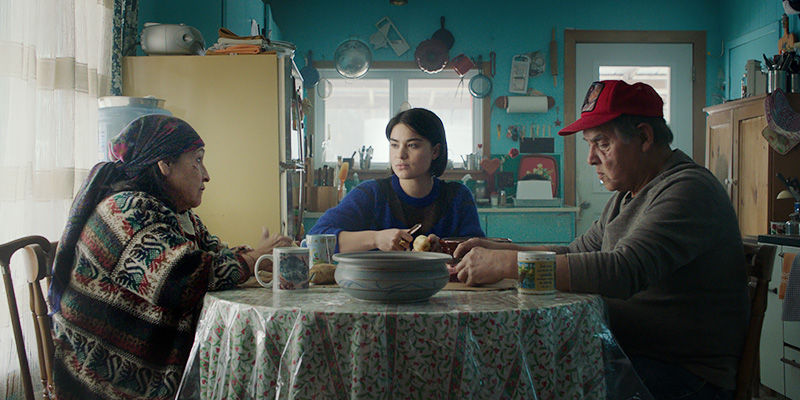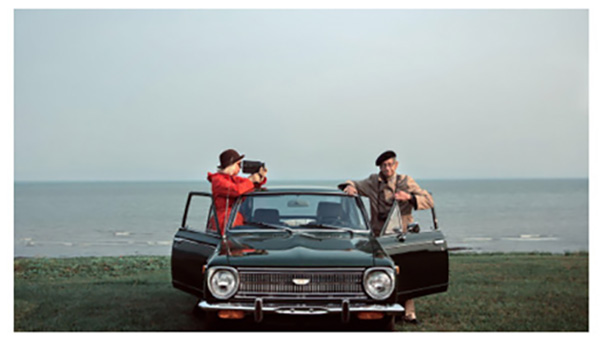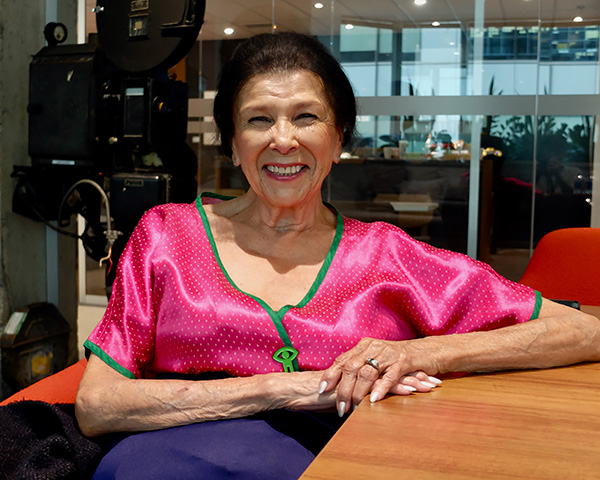Festivals, Festivals: Fast Forward and Rewind
By Maurie Alioff – Québec Correspondent
(September 29, 2021 – Montréal, Québec) As summer fades into fall, the days get shorter, and apprehension about cold and darkness kicks in, the film festival season has moved past two of the year’s major events: The Toronto International Film Festival and Quebec’s Fantasia, Canada’s most unique movie gathering.
At the time of writing, two Québec festivals are on the horizon. The Festival du nouveau cinéma (FNC) and the Rencontres internationales du documentaire de montréal (RIDM). The FNC has announced that its opening picture is Bootlegger, multidisciplinary artist Caroline Monnet’s first feature.

No doubt Monnet’s Algonquin origins led her to a story about a young woman (Kawennahere Devery Jacobs) who returns to her native community, where she has a troubled history. The personal drama unfolds during a communal stand-off over the sale of alcohol. A bootlegger who profits from booze sales is played by Québec star Pascale Bussières, now on view in Crave/Bell Media’s mini-series, Way Over Me. The festival closes with Archipelago, Félix Dufour-Laperrière’s animated documentary film about imaginary realms.
At the beginning of September, the FNC announced that New Zealand’s Jane Campion signed on to introduce her latest film, The Power of the Dog. Campion, an innovative and provocative director whose 1989 movie Sweetie brought her international recognition, followed it up with 1993’s The Piano, a picture that dropped jaws with its depiction of intense, at times perverse sexual relations. Campion, the first woman director to receive Cannes’s Palme d’or (for The Piano) got slated to offer a master class at the Imperial Cinema, the festival’s principal in-person venue. The FNC also plans to award Campion a Louve d’honneur for her achievements. The Imperial and its adjacent offices were once headquarters for the now defunct Festival des films du monde (FFM).
While those who run The Festival du nouveau cinéma are excited about 2021 marking the 50th anniversary of the event, they were saddened by the death of one of its co-founders. A notification from Nicolas Girard Deltruc, the fest’s Executive Director reads: “We learned with great sadness that Dimitri Eipides has passed away following a lengthy illness. Dimitri played a very important role in discovering new talents and emerging filmmakers who later shot to international renown.” Eipides went on to program and bolster TIFF, the Thessaloniki International Film Festival, and other events.
Way back at the end on the 1960’s Eipides ran a small theatre devoted to indie films on a spectrum from unconventional to completely nuts. I have a vague memory of watching a guy in a silk robe lie under a tree and masturbate for 20 minutes. A friend of mine collaborated on a hilarious collage flick in the Arthur Lipsett mode called You Be the Judge, You be the Jury. As far as I know only Eipides played it.
Following the Festival du nouveau cinéma, one of the world’s top documentary festivals, the Rencontres internationales du documentaire de montréal (RIDM) either premieres films or screens titles that drew attention at events like Hot Docs. Similar to the latter, it highlights special events and offers various business opportunities like its Forum, which draws hundreds of buyers and deal-makers from around the world.
At writing time, RIDM had closed its submission window. It also announced a few docs on its slate. Ousmane Samassékou’s The Last Shelter follows people in limbo as they lead their lives in a safe house on the edge of the Sahel. Both disturbing and visually beautiful, Screen International called it a “film full of compassion and empathy.”
RIDM 2021’s opening doc is Futura (which played the Quinzaine des réalisateurs and TIFF 2021). Billed as a “collective work” by Alice Rohrwacher, Pietro Marcello, and Francesco Munzi, the doc zooms in on Italian young people living on the cusp of daunting social change in their country.

The closing film is the world premiere of Joannie Lafrenière’s Gabor. Her feature debut doc portrays the Hungarian-born Montreal photographer, 93-year-old Gabor Szilasi. A fixture on Montreal’s cultural scene for decades, Szilasi is skilled and tasteful photographer with a reputation for decency and friendliness. I’ve enjoyed casual chats with him over the years.

Another anticipated RIDM film, Salomé Jashi’s Taming the Garden depicts a Georgian billionaire obsessed with uprooting age-old trees and transporting them to his private garden. Apparently, it plays like a fairy-tale directed by Werner Herzog. Is the billionaire acting on a delusion he can achieve immortality, does he simply want to revel in beauty, or he is he weirdly grasping more natural beauty than any man is entitled to?
Documentary, indie features, experimental shorts, Asian genre pictures and horror stories from everywhere in the world. Montreal has long been an effervescent movie town. The National Film Board of Canada emanated some of the energy, but much of it got triggered by maverick visionaries like the Festival du nouveau cinéma’s late co-founder Dimitri Eipides, his FNC confrere Claude Chamberlan, The Montreal World Film Festival’s founder and President, Serge Losique, reparatory cinema guru Roland Smith, still at it after 50 years, Fantasia’s Artistic Director Mitch Davis, the event’s originator, post-production company owner Pierre Corbeil, not to mention filmmakers like Canada’s Empress of Indigenous documentary, Alanis Obomsawin.

A recipient of a TIFF 2021 tribute, (the Jeff Skoll Award in Impact Media supported by Participant Media), Obomsawin has premiered many of her docs at the Toronto festival, beginning with 1984’s Incident at Restigouche. She has made 53 films, and at age 89, she has no intention of slowing down.
The only staff director at the NFB, Obomsawin once told me she disagrees with maverick journalist Robert Fisk, the subject of Yung Chang’s 2019 NFB doc This Is Not a Movie in which Fisk doubts that journalists and filmmakers ever change anything in society. For Obomsawin, making documentaries would be pointless if the films did not have an impact. “Not just me,” she said, “but documentary people do make a difference.”
Obomsawin points to her films We Can’t Make the Same Mistake Twice (2016) and Jordan River Anderson, the Messenger (2019), which helped in the cause of government funding to provide home care for native children with special needs. Until court cases were won, only non-native children benefitted from that aid. Native kids got yanked out of their homes in an echo of the notorious residential school system.
“The crime is to take the children away from their parents,” Obomsawin continued. “It’s disgusting. Who is going to love those children like their parents do? It’s hard to understand there are people like that who have the power to make changes, and can help, And choose not to, And not only that, torture them, separate them.”
In my interview, Obomsawin described individuals in a “conference group,” whose “aim was to make sure that nobody got money. Can you imagine that? And they even gave themselves an award for not spending money. Millions went back to treasury I guess.” All that has now changed. Special need native children can remain with their families, rather than be institutionalized.
Obomsawin is reluctant to describe ongoing projects because she doesn’t want to jinx them. “The main thing for me is that I’m so happy I have lived this long. To see the changes. I find that Canadians are now interested in what the true story was, and everywhere I go people want to know more, what it was like, and how the residential schools were hidden for so long. They are learning that story, and it’s only one part of it. I really believe there’s a lot of good people everywhere. We are changing, and I think we have to make sure that this continues.”
At an entirely different point on the spectrum of Montreal’s film visionaries, in the late 1990s, post-production company founder Pierre Corbeil and a few friends who loved Asian action pictures and genre films launched what became the country’s one-of-a-kind event. TIFF’s Midnight Madness covers the same territory and is a programming source for the Fantasia International Film Festival, but it’s a sidebar, not an unusually lengthy long (three weeks) film festival that attracts a huge loyal audience of genre fans, some of whom are so knowledgeable they can tell you who the key grip was on the original Halloween.
Originally a quasi-underground event, Fantasia eventually developed an internationally respected business component while keeping its original vibe alive. Now in its 25th year, the fest keeps events and major filmmakers who attend accessible to its audience. Says RogerEbert.com, “Genre fans will tell you that the true start to the [film festival] season comes when Montreal opens its doors to waves of films from around the world with a unique sensibility.”
The selection, Ghosting Gloria, is not a radical ground breaker, but it typifies the kind of film you’re unlikely to see elsewhere. An entertaining horror comedy from Uruguay, its breezy wackiness recalls Pedro Almodóvar’s films. The main character is a young woman who has her first orgasm when she makes love to a ghost.
While some programming features movies that follow strict genre protocols, Fantasia has a pact with its audience: give us your full attention, and we will probably blow your mind. That audience gets very raucous, its reactions to the content is vocal and visceral, but so quiet during contemplative moments, you can hear a pin drop.
During an interview for this year’s edition, Corbeil traced some recent history: “We created Frontières in 2011 to promote the production of genre films as part of co-production, to allow young directors to find partners and thus have the means to achieve their ambitions. Although the first edition of Fontières was produced without the help of the institutions, in the second year we received a major grant from a European organization, Media, as well as from SODEC (Quebec’s Société de Développement des Entreprises Culturelles), and Telefilm Canada. We then produced, in addition to the Montreal component at Fantasia, a European component in association with the Brussels Fantastic Festival, for three years. We have since produced editions, in association with the Cannes Film Market as well as in the Netherlands and Sweden.”

Fantasia’s number one ringmaster is the festival’s Artistic Director Mitch Davis. A moviemaker who was a fan, Davis quickly became a key team member. When he introduces films at major screenings he gets cheered like a rock star. “It’s really the best audience in the world,” Davis told an interviewer during the 2021 edition, “as excessive and chauvinistic as it may seem. There’s a reason so many filmmakers say how much they look forward to showing their film at specifically, ‘Fantasia audiences.’”
Davis offered his own origin story. Not anyone can help build an event devoted to fantasy moviemaking with so much encyclopedic knowledge, focus, and unrelenting passion.
“This long journey began when my parents took me to Disneyland,” Davis shared, “specifically to the Haunted House ride, which blew me away in every way. The imagery, the sounds and the mood, everything I could experience that day changed my life. I couldn’t help but talk about it for weeks, and I started begging my parents to get me horror comics, in order to regain that sense of urgency, deepen it and experience it in a more meaningful way. At the same time, I started this obsessive routine of voraciously browsing the weekly TV schedule as soon as the Saturday news arrived, highlighting everything that seemed to be in the realm of horror.”
In Grade 2, Davis projected Super 8 reels of horror pictures during Show & Tells. When Boris Karloff’s Frankenstein monster growled onto the screen, “Almost everyone loved it, but there were also screams and a girl in the class started crying, which immediately prompted my teacher to jump in front of the image and ordered me to turn off the projector. It was by standing in the back of the room and watching people react to the film in so many different ways that I realized how much I loved showing films to people.
“It is the public that makes this festival,” Davis continued, fully aware that for the foreseeable future, movie fests will need to continue merging live, in-person screenings with online streaming. Fantasia organized itself into “On the Big Screen,” its live programming, online “Scheduled Screenings,” and “On Demand Screenings (with expiry dates). 2021 also featured Special Events, numerous Q&As, Zoomed or YouTubed, and Tributes.
While The Festival du nouveau cinéma (FNC) and the Rencontres internationales du documentaire de montréal (RIDM), need to work out their own ways to run a complex event with Covid looming over them, both Fantasia and the Toronto International Film Festival are models of how to do it successfully.
For the first time in God knows how many years, I did not make it to TIFF, either in person or online. I got nostalgic about rushing to Press and Industry screenings, especially the ones that turned out to be pretty, pretty good, or great. I also enjoyed Intercontinental Hotel and other locale interviews, especially when the filmmakers were interesting and fun to chat with. Doesn’t work the same way on Zoom calls.
Following interviews, I often headed back to the Media Room in the TIFF Lightbox, hoping not all the pasta had been gobbled up, there was maybe one cookie left, and the coffee machine had not been drained. I missed the guy who grilled hot dogs on the corner of King and John. Tempted, I would calculate whether I’d be better off with something ostensibly more healthy for a quick food fix.
Speaking of food, I missed the lunch or dinner meets with friends and colleagues like Indian food at Aroma with producer Patricia Scarlett, not to mention the subway and streetcar rides to Cabbagetown, where it was always a pleasure to dine and chat with my welcoming host and hostess about everything from movies to how much we hate Donald Trump. Staying up until three a.m. in their dining room writing up my interviews at the comfy big table was a nice way to get stuff done.

My most surreal and comedic encounters at TIFF were with producer/critic/journalist Greg Klymkiw. I didn’t take the train from Montreal to Toronto this year, or get bamboozled by culture shock after getting off a plane from Jamaica, where I live near the village where the recently passed Lee Scratch Perry, the Godfather and Grandmaster of reggae music was born. So Klymkiw provided me with impressions and information I’m sharing in this flashback on the cusp of other festivals.
Sadly, and significantly he texted, “The hot dog guy was not there. I saw no street vendors anywhere.” And the Media Lounge was gone. However, “There was a press desk, and the nice ladies took your requests and got them to the appropriate parties.” Otherwise, “TIFF’s COVID protocols were first-rate. Requiring proof of double vaccination, no concessions, limited audience sizes, spacing/distancing of seating and mandatory mask use in all cinemas instilled considerable confidence that one was able to enjoy a big screen experience with the comfort of safety.”
Klymkiw went on to recall, “Everything I attended appeared to be at 1/3 capacity or less. A couple of screenings might have approached 50% capacity. There seemed to be less media and buyers present than in pre-pandemic times. The mood at public screenings was jubilant; people were very happy to be watching movies on a big screen. At press screenings, everyone was masked and physically distanced so there wasn’t the usual collegial critical chatter.” As for my least favourite TIFF ritual, “There are no crowds on King Street, and I have not noticed star gawking.”
As for the movies TIFF programmed, Klymkiw praised Sebastien Pilote’s Maria Chapdelaine as “still in a class onto itself. Nothing beats or matches it, clearly headed for masterpiece status. It is a film of overwhelming beauty and humanity, so moving that it inspired me to emit explosive geysers of tears, especially during the last 45 minutes or so. Sébastien Ricard and Gilbert Sicotte deliver beautiful monologues that had me sobbing almost uncontrollably. Sara Montpetit is astonishing. She reveals so much in a controlled restrained performance and it’s often impossible to take one’s eyes off her. This film is so intelligent, so literate and is a work of insurmountable lasting value. If Canada has an heir to Jean Renoir, it is Sébastien Pilote.”
Pilote, whose Le Vendeur is beautifully crafted and deeply moving, told me during an interview that he saw Maria Chapdelaine, the fourth version of the story on film, as an “anti-Western. It’s a novel that I’ve known for a long time. My idea was to return to the simplicity of the novel, the great forces.”
Not long after TIFF, Maria Chapdelaine opened in 119 Quebec theatres, topping all new releases with a return of $176,000 on its first weekend.
The other Quebec feature programmed at TIFF was Ivan Grbovic’s Les Oiseaux Ivres (Drunken Birds). Grbovic, whose origins are Serbian, drew attention with his 2011 debut, Roméo Onze. The new picture has the kind of hook that intrigues viewers. A drug-cartel worker falls hopelessly in love with his dangerous boss, thinks she’s taken off to Québec, follows her, and gets farm work, which leads to another level of complications.
Barring a major disaster like an alien invasion or a zombie apocalypse, hoping that the pandemic conspiracy theorists will start protecting themselves and the people around them, the film festival shows must and will go on. Fantasia and TIFF pulled it off, and there’s more to come. But it’s a melancholy fact that in small ways and large ones, festivals largely in cyberspace lack the in person connections that make them festive.
Also see: October 2021 Film Festivals.
![]() Maurie Alioff is a film journalist, critic, screenwriter and media columnist. He has written for radio and television and taught screenwriting at Montreal’s Vanier College. A former editor for Cinema Canada and Take One, as well as other magazines, he is affiliated with the Quebec media industry publication, CTVM.Info. His articles have appeared in various publications, including Canadian Cinematographer, POV Magazine, and The New York Times. He is the Québec Correspondent for northernstars.ca.
Maurie Alioff is a film journalist, critic, screenwriter and media columnist. He has written for radio and television and taught screenwriting at Montreal’s Vanier College. A former editor for Cinema Canada and Take One, as well as other magazines, he is affiliated with the Quebec media industry publication, CTVM.Info. His articles have appeared in various publications, including Canadian Cinematographer, POV Magazine, and The New York Times. He is the Québec Correspondent for northernstars.ca.


